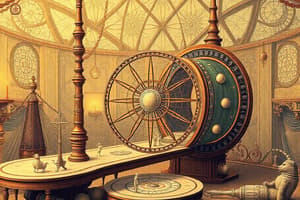Podcast
Questions and Answers
Which of the following is NOT a key concept studied in classical mechanics?
Which of the following is NOT a key concept studied in classical mechanics?
- Law of Conservation of Energy
- Wave-particle duality (correct)
- Newton's Laws of Motion
- Law of Conservation of Momentum
What does the Second Law of Thermodynamics primarily address?
What does the Second Law of Thermodynamics primarily address?
- Temperature measurement
- Phase transitions
- Entropy increase in closed systems (correct)
- Conservation of energy
In electromagnetism, which of the following is one of Maxwell's Equations?
In electromagnetism, which of the following is one of Maxwell's Equations?
- Kepler's Laws of Planetary Motion
- The Law of Conservation of Mass
- Newton's First Law
- Gauss's Law (correct)
Which unit is used to measure force in the International System of Units (SI)?
Which unit is used to measure force in the International System of Units (SI)?
What phenomenon does the concept of time dilation relate to?
What phenomenon does the concept of time dilation relate to?
Which fundamental force is responsible for holding protons and neutrons together in the nucleus?
Which fundamental force is responsible for holding protons and neutrons together in the nucleus?
Which statement best describes the field of astrophysics?
Which statement best describes the field of astrophysics?
Which law outlines the principle of thermal equilibrium in thermodynamics?
Which law outlines the principle of thermal equilibrium in thermodynamics?
Flashcards are hidden until you start studying
Study Notes
Overview of "Phy" (Physics)
- Physics is the natural science that studies matter, energy, and the fundamental forces of nature.
- It combines concepts from mathematics and experimental observations to explain physical phenomena.
Key Concepts in Physics
-
Classical Mechanics
- Studies the motion of objects and the forces acting upon them.
- Key laws: Newton's Laws of Motion, Law of Conservation of Energy, and Law of Conservation of Momentum.
-
Thermodynamics
- Deals with heat, work, temperature, and energy transformations.
- Key laws:
- Zeroth Law (thermal equilibrium)
- First Law (energy conservation)
- Second Law (entropy)
- Third Law (absolute zero)
-
Electromagnetism
- Explores electric charges, electric fields, magnetic fields, and their interactions.
- Key equations: Maxwell's Equations.
-
Optics
- Studies light behavior and its interactions with matter.
- Concepts include reflection, refraction, and diffraction.
-
Quantum Mechanics
- Examines physical phenomena at microscopic scales (particles like atoms and subatomic particles).
- Key principles: Wave-particle duality, uncertainty principle, quantum entanglement.
-
Relativity
- Introduced by Albert Einstein, encompasses Special Relativity (constant speed of light and time dilation) and General Relativity (gravity as curvature of spacetime).
Important Units and Measurements
-
SI Units
- Length: Meter (m)
- Mass: Kilogram (kg)
- Time: Second (s)
- Electric Current: Ampere (A)
- Temperature: Kelvin (K)
- Amount of Substance: Mole (mol)
-
Common Measurements
- Force: Newton (N)
- Energy: Joule (J)
- Power: Watt (W)
Fundamental Forces
-
Gravitational Force
- Attraction between masses.
-
Electromagnetic Force
- Interaction between charged particles.
-
Weak Nuclear Force
- Responsible for radioactive decay.
-
Strong Nuclear Force
- Holds protons and neutrons together in the nucleus.
Applications of Physics
- Engineering: Design of structures, vehicles, and machinery.
- Medical Physics: Imaging technologies (MRI, X-rays), radiation therapy.
- Renewable Energy: Solar panels, wind turbines.
- Astrophysics: Study of celestial bodies and the universe.
Conclusion
- Physics is a vast field that underpins numerous scientific disciplines and technological advancements, providing a framework for understanding the natural world.
Overview of Physics
- Physics is the natural science focused on matter, energy, and fundamental forces of nature.
- Integrates mathematical concepts with experimental observations to explain phenomena.
Key Concepts in Physics
-
Classical Mechanics
- Analyzes motion and forces on objects.
- Governed by Newton's Laws of Motion, Conservation of Energy, and Conservation of Momentum.
-
Thermodynamics
- Concerns heat, temperature, work, and energy transformations.
- Encompasses four key laws contributing to the understanding of thermal systems.
-
Electromagnetism
- Investigates electric and magnetic fields and interactions between charged particles.
- Central to this field are Maxwell's Equations, which describe how electric and magnetic fields propagate and interact.
-
Optics
- Studies the behavior of light and its interactions with materials.
- Key concepts include reflection, refraction, and diffraction of light.
-
Quantum Mechanics
- Focuses on phenomena at microscopic scales, such as atoms and subatomic particles.
- Highlights principles like wave-particle duality, the uncertainty principle, and quantum entanglement.
-
Relativity
- Developed by Albert Einstein, includes Special Relativity (constant speed of light, time dilation) and General Relativity (gravity is the curvature of spacetime).
Important Units and Measurements
-
SI Units
- Length measured in meters (m)
- Mass measured in kilograms (kg)
- Time measured in seconds (s)
- Electric current measured in amperes (A)
- Temperature measured in kelvin (K)
- Amount of substance measured in moles (mol)
-
Common Measurements
- Force measured in newtons (N)
- Energy measured in joules (J)
- Power measured in watts (W)
Fundamental Forces
-
Gravitational Force
- The force attracting two masses towards each other.
-
Electromagnetic Force
- The force acting between charged particles.
-
Weak Nuclear Force
- Responsible for processes like radioactive decay.
-
Strong Nuclear Force
- The force that binds protons and neutrons within an atomic nucleus.
Applications of Physics
-
Engineering
- Physics informs the design of infrastructure, vehicles, and machinery.
-
Medical Physics
- Involves technologies for imaging (MRI, X-rays) and radiation therapy.
-
Renewable Energy
- Physics principles guide the development of solar panels and wind turbines.
-
Astrophysics
- Uses physics to study celestial objects and the broader universe.
Conclusion
- Physics forms the foundational framework for various scientific disciplines and technological advancements, enhancing our understanding of the natural world.
Studying That Suits You
Use AI to generate personalized quizzes and flashcards to suit your learning preferences.




